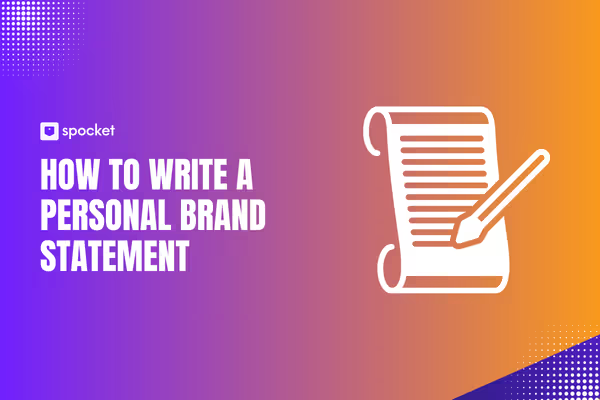Personal Brand Statement Writing
Learn how to write a compelling personal brand statement that defines your expertise, highlights your strengths, and attracts the right audience. Step-by-step guide with examples.


A personal brand statement is a short yet powerful sentence that defines who you are, what you do, and how you add value. It sets you apart in your industry and helps others understand your expertise at a glance.
Whether you're a freelancer, entrepreneur, or professional, crafting a brand statement is essential for standing out. It’s like an elevator pitch for professionals, helping you make a strong first impression.
This blog will guide you through how to brand yourself professionally, create a compelling statement, and use it effectively. With the right approach, you can build credibility, attract opportunities, and position yourself as an expert in your field. Let’s get started!
What is a Personal Brand Statement?
A personal brand statement is a clear and concise sentence that defines who you are, what you do, and how you bring value. It’s like an elevator pitch for professionals, giving people a quick understanding of your expertise. A well-crafted statement helps in defining your personal brand and positioning yourself as an authority in your field.
It’s used on LinkedIn, resumes, websites, and social media bios. Whether you're a freelancer, entrepreneur, or job seeker, having a strong personal branding strategy can set you apart.
Definition and Purpose of a Personal Brand Statement
A personal brand statement is a short but impactful introduction that captures your professional identity. It summarizes your skills, experience, and what makes you unique.
The purpose is to position yourself in your industry and attract the right opportunities. It helps potential employers, clients, or partners instantly understand what you bring to the table.
Think of it as writing a personal tagline that highlights your expertise and what makes you stand out.
Key Elements of a Strong Brand Statement
A great personal brand statement includes these key elements:
- Clarity: It should be easy to understand in one quick read.
- Uniqueness: Show what sets you apart from others in your field.
- Value Proposition: Highlight how you solve problems or add value.
- Conciseness: Keep it short and impactful.
A good personal branding strategy ensures your statement aligns with your career goals and industry expectations.
Why Your Brand Statement Matters
A personal brand statement is more than just a tagline. It helps you create a strong first impression and makes networking easier. People remember you better when you have a clear and engaging way to introduce yourself.
It also plays a key role in building a personal brand online. A well-crafted statement can enhance your LinkedIn profile, website, and social media presence. Whether you're looking for a job, clients, or partnerships, your statement is a powerful tool for standing out.
How to Write a Personal Brand Statement
Your personal brand statement is like a quick introduction that tells people who you are, what you do, and why they should pay attention to you. Think of it as your professional tagline—the one sentence that sums up your expertise and value.
But writing one isn’t always easy. How do you condense your entire professional identity into a few words? Don’t worry—I’ll walk you through it step by step. By the end, you’ll have a clear, compelling personal branding strategy that positions you as an authority in your field.
Let’s break it down.
Identify Your Strengths and Expertise
Before you start writing, take a moment to reflect on what makes you unique. Your skills, experiences, and personal qualities all play a role in shaping your personal brand statement.
Make a List of Your Core Skills and Unique Qualities
Grab a notebook or open a document and start brainstorming. Ask yourself:
- What do people come to me for advice on?
- What skills or talents do I naturally excel at?
- What achievements am I most proud of?
- How do I solve problems better or differently than others?
Your answers will help shape your unique selling proposition—the thing that makes you stand out. If you’re struggling, ask a friend, mentor, or colleague for their input. Sometimes, others see our strengths more clearly than we do.
Focus on Your Professional Niche
A great personal brand statement is specific. Instead of saying, "I'm a digital marketer," you could say, "I help small businesses grow their online presence through data-driven digital marketing strategies."
See the difference? The second version tells us who you help, how you help them, and what makes your approach unique.
The more specific you can be about your niche, the stronger your brand statement will be. This also helps when you're networking or positioning yourself in the job market.
Define Your Target Audience
Your personal brand statement should speak directly to the right people. Whether you’re aiming to attract clients, employers, or business partners, your message should resonate with them.
Who Needs Your Expertise?
Think about the people who benefit most from what you do. Are they:
- Small business owners looking for marketing help?
- Job seekers who need career coaching?
- Companies needing branding strategies?
Your audience determines the language and tone of your statement. For example, a corporate consultant might use a more formal tone, while a personal trainer might use a high-energy, motivational style.
Understanding Industry-Specific Needs
Every industry has different expectations. A tech entrepreneur might emphasize innovation, while a life coach might focus on transformation. Your brand statement should align with the needs and values of your field.
Here’s a simple formula: I help [specific audience] achieve [specific result] by [your expertise or approach].
For example:
- "I help startups create strong brand identities through compelling storytelling and visual design."
- "I guide mid-career professionals in landing their dream jobs by refining their personal brands and resumes."
When your audience reads your statement, they should immediately think, “That’s exactly what I need!”
Craft a Clear and Concise Message
Your personal brand statement should be short, powerful, and easy to remember. It’s not your life story—it’s a quick way to introduce yourself and your expertise.
Use Simple, Impactful Language
Avoid jargon or buzzwords that don’t add value. Instead of saying, "I leverage innovative strategies to drive engagement," say, "I create marketing campaigns that turn followers into customers."
Simple, direct language is always more effective.
Keep It Short but Powerful
The best personal brand statements are one to two sentences long. If you can say it in fewer words, even better.
Think of it this way: If someone asked you, "What do you do?" and you had only five seconds to answer, what would you say?
Aim for clarity, not complexity.
Add a Unique and Creative Flair
A generic brand statement won’t make you memorable. You need a touch of creativity to stand out.
Infuse Personality into Your Statement
Your brand statement should sound like you. If you're known for being bold and energetic, let that come through in your words. If you’re more analytical and strategic, reflect that in your phrasing.
For example, compare these two:
- "I provide consulting services for business growth." (Boring and vague)
- "I’m the problem-solver behind six-figure business turnarounds." (Memorable and engaging)
Which one grabs your attention? Memorable and engaging one, right? Exactly.
Show How You Solve a Problem
A great personal brand statement highlights how you help others. It’s not just about what you do—it’s about how you create value.
For example:
- "I turn struggling brands into household names through strategic branding and storytelling."
- "I help busy professionals stay in top shape with quick, effective fitness routines."
If your statement answers, “What’s in it for me?” from your audience’s perspective, you’re on the right track.
Refine and Test Your Statement
Even after you write your first draft, you’re not done yet. Refining your statement ensures it’s as impactful as possible.
Get Feedback from Peers and Mentors
Run your brand statement by colleagues, mentors, or industry peers. Ask them:
- Does this clearly explain what I do?
- Is it compelling?
- Would you remember it after hearing it once?
If people seem confused or unimpressed, tweak your wording.
Adjust for Clarity and Impact
Your personal brand statement should evolve as you grow in your career. Set a reminder to revisit and refine it every few months. As your skills, goals, and audience change, so should your statement.
Think of it as a living document that grows with you.
Personal Brand Statement Examples
Your personal brand statement should reflect your expertise, personality, and value. But sometimes, coming up with the perfect one can be challenging. Looking at examples can help you define your personal brand and structure your statement in a way that feels natural and impactful.
Below are strong personal branding statement examples for different industries, along with tips on how to adapt them for various platforms like LinkedIn, social media, and resumes.
Strong Brand Statements in Different Industries
Different industries require different approaches when crafting a brand statement. Your industry influences how formal, creative, or results-driven your message should be.
Leadership and Business Example
A business leader’s statement should showcase expertise, influence, and the ability to drive results.
Example: "I help businesses scale by implementing strategic leadership, innovative problem-solving, and data-driven decision-making."
This statement works well for executives, consultants, and leadership coaches. It highlights expertise and impact in a concise way.
Creative Industry Example
Creatives need to showcase their unique approach and artistic flair. Whether you’re a designer, writer, or filmmaker, your statement should reflect originality.
Example: "I bring brands to life with visually stunning and emotionally engaging designs that connect with audiences."
This brand statement positions the person as a storyteller and an expert in creating engaging content.
Marketing and Branding Example
Marketing professionals should emphasize results and how they help brands grow.
Example: "I help businesses increase visibility and engagement through data-driven digital marketing and brand storytelling."
This statement appeals to companies looking for marketing expertise and branding strategies that deliver measurable success.
Entrepreneurship Example
Entrepreneurs need a strong brand statement that showcases their vision and ability to create impact.
Example: "I build innovative startups that solve real-world problems and create meaningful customer experiences."
This positions the entrepreneur as a visionary leader focused on innovation and impact.
How to Tailor a Brand Statement for Different Platforms
Your personal brand statement should be flexible enough to fit different platforms. A LinkedIn bio might be more detailed, while a social media tagline needs to be shorter. Here’s how to adapt your statement based on where you use it.
LinkedIn Personal Brand Statement
LinkedIn allows for a slightly longer introduction. It should clearly explain your role, expertise, and how you bring value.
Example: "As a digital marketing strategist, I help brands scale by leveraging data-driven campaigns, SEO, and compelling content. With a passion for innovation, I’ve helped companies increase their online reach by 200%."
This combines an elevator pitch for professionals with real impact and credibility.
Social Media Bio Example
Social media bios need to be short and engaging. They should grab attention and summarize your expertise in a few words.
Example: "Brand strategist | Storyteller | Helping businesses grow through creative marketing."
This is concise, memorable, and quickly tells people what you do.
Resume and Cover Letter Example
In a resume or cover letter, your personal branding statement should be professional and focused on what you bring to the company.
Example: "Marketing expert with 5+ years of experience in growing brands through targeted campaigns, content marketing, and SEO strategies. Passionate about helping businesses maximize their online presence."
This makes it clear what the candidate specializes in and why they are a strong fit.
Tips for Crafting a Great Personal Brand Statement
A personal brand statement is more than just a catchy tagline. It’s a reflection of who you are, what you do, and how you add value. The best statements are clear, engaging, and aligned with your career goals. Here are some tips to help you create a brand statement that stands out.
Keep It Short and Impactful
Your personal brand statement should be easy to remember. A strong statement is short, clear, and straight to the point. Think of it as an elevator pitch for professionals—you should be able to say it in one breath.
Instead of saying, "I have over a decade of experience in strategic marketing, brand development, and digital growth strategies, helping companies expand their customer base and drive revenue."
Try this: "I help brands grow through data-driven marketing and strategic storytelling."
The second version is simple yet powerful. Keep your message clear and avoid unnecessary words.
Reevaluate and Update Your Statement Regularly
Your personal branding strategy should evolve as your career grows. The statement that worked for you last year may not reflect where you are today.
Revisit your brand statement every few months. Ask yourself:
- Does this still represent my expertise?
- Have my career goals changed?
- Is there a better way to communicate my value?
If your job role, industry, or target audience has shifted, tweak your statement to stay relevant. Updating your statement ensures that it always reflects the best version of you.
Stay Authentic and Avoid Exaggeration
It’s tempting to make your personal brand statement sound grand or impressive, but honesty is key. Exaggerating your skills or using vague buzzwords won’t make you stand out. Instead, focus on what truly makes you unique.
Instead of saying, "I am a world-class expert in marketing, known for transforming businesses overnight."
Try: "I help businesses increase visibility and engagement through strategic marketing and data-driven insights."
Being authentic helps build trust. When people read your statement, they should feel like they’re getting the real you, not a sales pitch.
Align Your Brand Statement with Your Career Goals
Your personal brand statement should reflect where you are now and where you want to go. It’s not just about what you do today—it should also position you for future opportunities.
Ask yourself:
- Do I want to attract clients, employers, or business partners?
- What career direction am I aiming for?
- Does my brand statement align with my long-term goals?
For example, if you're transitioning into leadership, your statement could be:
"I help businesses scale by leading high-performance teams and driving strategic growth."
If you're shifting to entrepreneurship:
"I empower startups with creative branding and digital marketing solutions."
By aligning your statement with your ambitions, you ensure that it attracts the right opportunities.
Conclusion
A personal brand statement is a powerful tool that helps you stand out, communicate your value, and attract the right opportunities. Whether you're networking, job hunting, or building an online presence, a strong statement makes a lasting impression.
Keep it short, clear, and authentic. Update it as your career evolves and align it with your long-term goals. A well-crafted personal branding strategy positions you as an expert and opens new doors.
Take the time to refine your statement, test it, and use it across platforms. Your personal brand is your reputation—make sure it speaks for you in the best way possible.
Personal Brand Statements FAQs
Why Do I Need a Personal Brand Statement?
A personal brand statement helps you define who you are, what you do, and how you add value. It makes you stand out, builds credibility, and helps you attract the right opportunities.
How Long Should a Personal Brand Statement Be?
Ideally, it should be one to two sentences long. Keep it short, clear, and impactful—just like an elevator pitch for professionals.
What Are the 4 Cs of Personal Branding?
The 4 Cs of personal branding are clarity, consistency, credibility, and competitiveness. Your statement should be clear, aligned with your message, and set you apart in your industry.
Where Should I Use My Personal Brand Statement?
Use it on LinkedIn, resumes, cover letters, personal websites, social media bios, and networking events to create a strong and consistent professional identity.
How Do I Know If My Personal Brand Statement is Effective?
A strong personal brand statement should be easy to remember, clearly communicate your expertise, and attract the right audience. Get feedback from peers and ensure it aligns with your career goals.
Launch your dropshipping business now!
Start free trialRelated blogs

2026 Podcast Monetization Playbook: Best Podcasting Platforms that Make You Money
Find the best podcast platform for monetization in 2026. See which hosts offer the highest payouts and lowest fees for your show.

Top 10 Valentine Gifts for Girlfriend
Looking for the perfect Valentine gift for your girlfriend? Discover the top 10 romantic, thoughtful, and trending Valentine gifts she'll love.

What is the Cost of Living in Montana in 2026?
Learn the real cost of living in Montana for 2026, including housing, groceries, and taxes. This guide covers what you need to earn and where to live affordably in Big Sky Country.


































